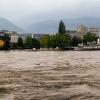
After the devastating floods that recently struck Vienna and other areas of Europe, global attention has turned to the need for better tools to combat climate change impacts. President of the European Commission, Ursula von der Leyen, also highlighted the need to build a competitive, decarbonized and circular economy, with a fair transition for all as a high-priority objective for this legislature. In this spirit, the Open Earth Monitor project will kick off the second edition of its flagship event in collaboration with IIASA on 2 October.
Extreme climate events, such as the dramatic droughts in southern Europe at the beginning of the year and the recent floods and storms in central-eastern Europe, call for urgent scientific action. In that sense, new Earth Observation technologies and approaches are expected to be developed to facilitate the work of policy and decision makers. Over the course of three days, world-renowned experts in the Earth Observation field will gather to showcase advanced monitoring tools that will serve several European actors to support new and existing climate policies and legislation like the recently approved European Restoration Law.
“The need for FAIR, open, and readily accessible data is at the heart of the Open-Earth-Monitor (OEMC) project. We aim to gather data and transform it into something meaningful”, explains Tom Hengl, coordinator of the OEMC project and director of the Opengeohub Foundation. “For the second edition of the Open-Earth-Monitor Global Workshop, we have invited some of the most renowned experts in the geospatial field. Elizabeth Goldman (World Resources Institute); Mark Dowell (Copernicus Program & EU JRC); Paola de Salvo (Group of Earth Observations); and Inge Jonckheere (European Space Agency) are among a selected group of keynote speakers, who will give presentations on topics like data openness, Earth Observation for policymaking, the Amazon Deforestation use case, and many others that are part of the program.”
The second edition of the Open Earth Monitor Global Workshop will take place at the IIASA premises and the Conference Center in Laxenburg, Austria, from 2 to 4 October 2024. The opening ceremony will commence at 09:45 CET, and a presentation will be given by IIASA Director General Hans Joachim (John) Schellnhuber, who is also a co-organizer of the workshop titled, The Role of Earth Observation for the European Bauhaus Initiative.
“Over the course of the three days featuring international speakers, we will explore valuable opportunities to improve geospatial research and application products in open-source and to make them more relevant for policy,” says Steffen Fritz, principal research scholar and leading partner from IIASA within the Open-Earth-Monitor project.
“The Horizon-Europe project “Open-Earth-Monitor’ seeks to accelerate the cross-border exploitation of key environmental data, based on FAIR and open data principles. We are convinced that to increase the usability of our results we need to interact with and involve diverse communities. That is why we strive to include both leading members of the GIS research community as well as PhD students and young researchers, who have a lot to say. In addition, we strongly believe in the need for a gender-equal approach in this debate,” notes Katya Perez Guzman, a research scholar in the Novel Data Ecosystems for Sustainability Research Group of the IIASA Advancing Systems Analysis Program.
The Open-Earth-Monitor consortium, consisting of 23 international organizations, research institutes and private businesses from Europe and beyond, is also working closely with the European Space Agency (ESA), EuroGEO (European members of the Group on Earth Observations), and the GEOSecretariat on enabling easier access to environmental information through use cases and workshops.
Further information
Open Earth Monitor Global Workshop 2024
News

04 October 2024
Countries under fiscal pressure from recent disaster events

26 September 2024
In Memory of Yuri Ermoliev

26 September 2024


